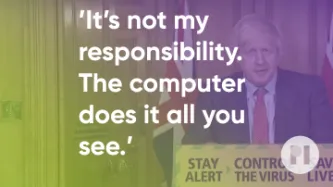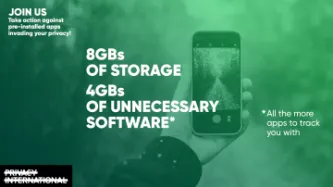Advanced Search
Content Type: News & Analysis
An excerpt of this piece was first published in June 2020 in Adbusters, an international not-for-profit magazine produced by a global collective of artists and activists who want to 'shake up complacent consumer culture'.
Big oil. Big tobacco. Big pharma. How did we let ‘big tech’ happen? You would have thought humanity would learn its lesson. That nothing good comes of the mass accumulation and concentration of power into the hands of so few.
The internet was meant to be different. No…
Content Type: Advocacy
International data transfers are an important feature of the present-day global economy. However, when crossing borders, data should also be accompanied by strong and effective privacy and personal data protections. Laws, such as the General Data Protection Regulation (GDPR), play an important role in ensuring data flows respect with privacy.
Trade negotiations that cover cross-border data flows can complicate this. All 80 countries that are part of digital trade negotiations should be able to…
Content Type: Long Read
Privacy International (PI) and 13 other civil society organisations from Europe and Africa are calling for urgent reforms to EU aid and cooperation programmes to ensure they promote privacy protections in non-member countries and do not facilitate the use of surveillance which violates fundamental rights.It comes following the public release of hundreds of documents…
Content Type: News & Analysis
Le « Fonds fiduciaire d’urgence de l’Union européenne en faveur de la stabilité et de la lutte contre les causes profondes de la migration irrégulière et du phénomène des personnes déplacées en Afrique » (le « fonds fiduciaire pour l’Afrique ») ne fait pas les grands titres (et il est plutôt difficile à retenir), mais son influence est vaste et aura des conséquences pendant plusieurs décennies sur la vie de millions de personnes sur le continent africain.
Mis en place suite à la « crise…
Content Type: News & Analysis
The “EU Trust Fund for Stability and Addressing Root Causes of Irregular Migration and Displaced Persons in Africa” (EUTF for Africa) isn’t exactly headline news (and nor does it exactly roll off the tongue), but its influence is vast and will be felt for decades to come for millions of people across Africa.
Set up in the wake of the 2015 ‘migration crisis’ in Europe and largely made up of money earmarked for development aid (80% of its budget comes from development and humanitarian aid funds…
Content Type: Frequently Asked Questions
On 27 October 2020, the UK Information Commissioner's Office (ICO) issued a report into three credit reference agencies (CRAs) - Experian, Equifax and TransUnion - which also operate as data brokers for direct marketing purposes.
After our initial reaction, below we answer some of the main questions regarding this report.
Content Type: Long Read
As more and more of us feel compelled to cover our faces with masks, companies that work on facial recognition are confronted with a new challenge: how to make their products relevant in an era where masks have gone from being seen as the attribute of those trying to hide to the accessory of good Samaritans trying to protect others.
Facewatch is one of those companies. In May 2020, they announced they had developed a new form of facial recognition technology that allows for the…
Content Type: Video
The two-minute video splices together clips of UK Prime Minister Boris Johnson, cleverly editing his speeches so that he mouths sentences such as:
'Coronavirus won’t affect you if your immunity passport’s blue'
'You can tell our technology’s going well, we’re running this whole thing in Excel'
'A mutant algorithm trick, when it goes wrong, the blame won’t stick'
'Our system’s world-beating at self-defeating'
'So when results are not forthcoming, don’t ask me, ask Dominic…
Content Type: Press release
The new satirical video is a critique of the government's reliance on 'technological solutionism' in the fight against Coronavirus and increasingly across public services more widely, and their willingness to then scapegoat ‘mutant algorithms’ when their hopes for technological panaceas inevitably fail.
The two-minute video splices together clips of Prime Minister Boris Johnson, cleverly editing his speeches so that he mouths sentences such as:
'Coronavirus won’t affect you if your immunity…
Content Type: Long Read
An edited version of this article was originally published on the EDRi website in September 2020.
Introduction
Monopolies, mergers and acquisitions, anti-trust laws. These may seem like tangential or irrelevant issues for privacy and digital rights organisations. But having run our first public petition opposing a big tech merger, we wanted to set out why we think this is an important frontier for people's rights across Europe and indeed across the world.
In June, Google notified the…
Content Type: News & Analysis
The Law Enforcement Data Service (LEDS) is a unified, common interface to a new mega-database currently being developed by the Home Office National Law Enforcement Data Programme (NLEDP). We believe that the development of the programme poses a threat to privacy and other rights and must be subjected to strong oversight, safeguards, and transparency measures.
As we explained in our analysis, the data in LEDS is vast, ever-increasing, worryingly mixes both evidential and intelligence material –…
Content Type: News & Analysis
A new report by the UN Working Group on mercenaries analyses the impact of the use of private military and security services in immigration and border management on the rights of migrants, and highlights the responsibilities of private actors in human rights abuses as well as lack of oversight and, ultimately, of accountability of the system.
Governments worldwide have prioritised an approach to immigration that criminalises the act of migration and focuses on security.
Today, borders are not…
Content Type: News & Analysis
Back in January, Privacy International and over 50 other organisations wrote to Google asking the company to take action over pre-installed apps that cannot be deleted (often known as “bloatware”), which can leave users vulnerable to their data being collected, shared and exposed without their knowledge or consent. Thousands of people from over 50 countries signed our petition supporting this ask. We welcome the constructive conversations we had with Google following this campaign and for the…
Content Type: News & Analysis
In the last few weeks, the UK government has announced various new measures to ensure that crossings across the Channel were “inviable” including by appointing a new role of “clandestine Channel threat commander" and further plans to deploy the navy to stop migrants from crossing to the UK from France across the Channel. Premature plans it seems, as not only would such measures be contrary to the UK’s international obligations to allow individuals to seek asylum in the UK, but also since such…
Content Type: News & Analysis
Banning TikTok? It's time to fix the out-of-control data exploitation industry - not a symptom of it
Chinese apps and tech companies have been at the forefront of the news recently. Following India's ban of 59 chinese apps in July, President Trump announced his desire to ban TikTok, shortly followed by his backing of Microsoft's intention to buy the US branch of its parent company ByteDance. Other than others lip syncing his public declaration, what does President Trump fear from this app, run by a firm, based in China?
It's all about that data
One clear answer emerges: the exploitation of…
Content Type: Case Study
Numerous sexist, mysoginistic, homophobic and racist practices are flourishing online, in ways that are harder for national authorities to stop than when abuse takes place offline. One of these practices is ‘revenge pornography’, which involves online distribution of private sexual images without the consent of the person depicted.
One victim of image based sexual abuse (more commonly known as revenge porn): Chrissy Chambers. Chrissy was 18 years old when her boyfriend convinced her to spend…
Content Type: News & Analysis
New technologies continue to present great risks and opportunities for any users but for some communities the implications and harms can have severe consequences and one of the sectors facing increasing challenges to keep innovating whilst protecting themselves and the people they serve is the humanitarian sector.
Over the course of engagement with the humanitarian sector, one of our key observations has been how risk assessments undertaken in the sector omitted to integrate a hollistic…
Content Type: News & Analysis
The UN Special Rapporteur on the promotion and protection of human rights and fundamental freedoms while countering terrorism, Professor Fionnuala Ní Aoláin together with Dr. Krisztina Huszti-Orbán, released today a key report on the “Use of Biometric Data to Identify Terrorists: Best Practice or Risky Business?”.
The report explores the human rights risks involved in the deployment of biometrics emphasising that
in the absence of robust rights protections which are institutionally embedded…
Content Type: Explainer
Definition
An immunity passport (also known as a 'risk-free certificate' or 'immunity certificate') is a credential given to a person who is assumed to be immune from COVID-19 and so protected against re-infection. This 'passport' would give them rights and privileges that other members of the community do not have such as to work or travel.
For Covid-19 this requires a process through which people are reliably tested for immunity and there is a secure process of issuing a document or other…
Content Type: Advocacy
Identification systems across the world increasingly rely on biometric data. In the context of border management, security and law enforcement, biometric data can play an important role in supporting the investigation and prevention of acts of terrorism.
This Briefing aims to map out some of the implications of the adoption of identification systems based on biometrics.
Content Type: Long Read
Over the last two decades we have seen an array of digital technologies being deployed in the context of border controls and immigration enforcement, with surveillance practices and data-driven immigration policies routinely leading to discriminatory treatment of people and undermining peoples’ dignity.And yet this is happening with little public scrutiny, often in a regulatory or legal void and without understanding and consideration to the impact on migrant communities at the border and…
Content Type: News & Analysis
In September 2019, PI published the report Your Mental Health for Sale. Our investigation looked into popular mental health websites and their data sharing practices.
Our findings suggest that, at the time of the research, most websites we looked at were using third party tracking for advertising purposes, sometimes relying on programmatic advertising technologies such as Real Time Bidding (RTB), sharing personal data with potentially thousands of actors. Some websites were also found sharing…
Content Type: Advocacy
The entire election cycle is increasingly data dependent. This is particularly the case with political campaigns which are ever more digital and data driven. This campaign environment presents novel challenges due to the scale and range of data available together with the multiplicity, complexity and speed of profiling and targeting techniques. All of this is characterised by its opacity and lack of accountability. Existing legal frameworks designed to curtail this exploitation often also fall…
Content Type: Case Study
The EU have been using foreign aid budgets, not to lift people out of poverty, but to export surveillance technologies used to repress people’s human rights all over the world.
A wave of anti-immigration fervour has swept across Europe in recent years. As leaders have come to power across Europe either on anti-immigration platforms or having to respond to an anti-immigration sentiment, the EU’s recent policies have been shaped by the drive to stop migration to Europe.
Surveillance…
Content Type: Long Read
What Do We Know?
Palantir & the NHS
What You Don’t Know About Palantir in the UK
Steps We’re Taking
The Way Forward
This article was written by No Tech For Tyrants - an organisation that works on severing links between higher education, violent tech & hostile immigration environments.
Content Type: Report
The majority of people today carry a mobile phone with them wherever they go, which they use to stay connected to the world. Yet an intrusive tool, known as an International Mobile Subscriber Identity catcher, or “IMSI catcher” is a form of surveillance equipment that enables governments and state authorities to conduct indiscriminate surveillance of mobile devices, and by extension, on users.
IMSI catchers can do much more than monitor and intercept mobile communications. Designed to imitate…
Content Type: News & Analysis
Name: Google/Fitbit mergerAge: GestatingAppearance: A bit dodgy. One of the world’s biggest tech giants, trying to purchase a company that makes fitness tracking devices, and therefore has huge amounts of our health data.I don’t get it. Basically Google is trying to buy Fitbit. As if Google doesn’t already have enough data about us, it now wants huge amounts of health data too.Oh, Fitbit, that’s that weird little watch-type-thing that people get for Christmas, wear for about a month while they…
Content Type: Video
Immediately following the UK general election in December 2019, we worked with Open Rights Group to commission a YouGov poll about public understanding and public opinion about the use of data-driven campaigning in elections.
The poll used a representative sample of 1,664 adults across the UK population.
'Data-driven political campaigning' is about using specific data about you to target specific messages at you. So, for this might involve knowing that you are, for example, likely to…
Content Type: Call to Action
Google wants to know everything about you.It already holds a massive trove of data about you, but by announcing its plans to acquire the health and fitness tracker company Fitbit, it now clearly wants to get its hands on your health too. We don’t think any company should be allowed to accumulate this much intimate information about you. This is why we’re trying to stop its merger with Fitbit.Google and Fitbit need the European Commission’s approval before they can merge. The merger would have…
Content Type: Press release
Today, the ICO has issued a long-awaited and critical report on Police practices regarding extraction of data from people's phones, including phones belonging to the victims of crime.
The report highlights numerous risks and failures by the police in terms of data protection and privacy rights. The report comes as a result of PI’s complaint, dating back to 2018, where we outlined our concerns about this intrusive practice, which involves extraction of data from devices of victims, witnesses…




























